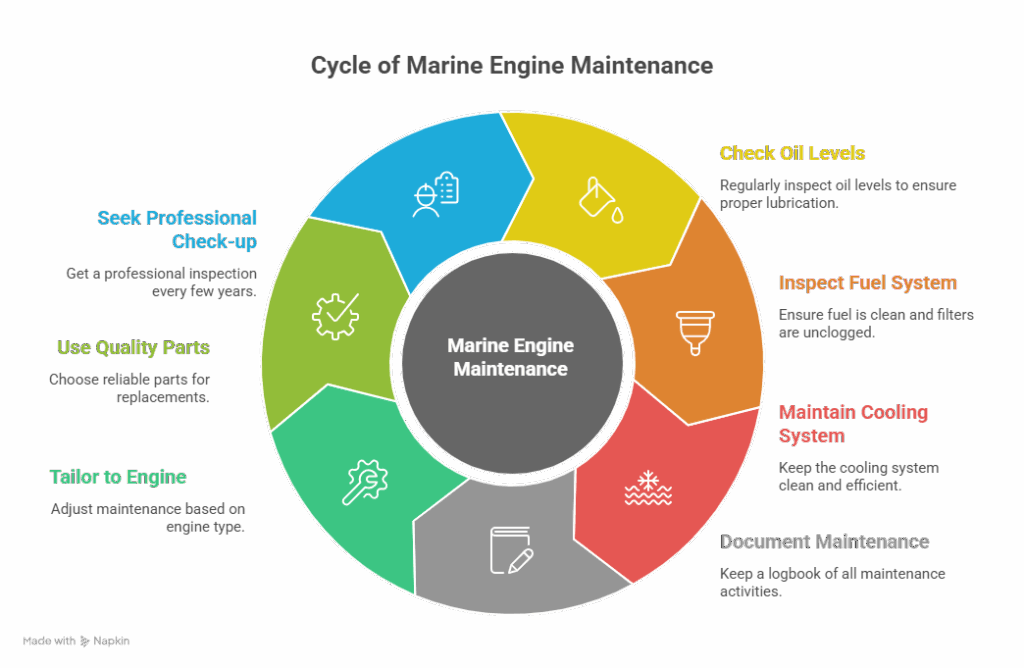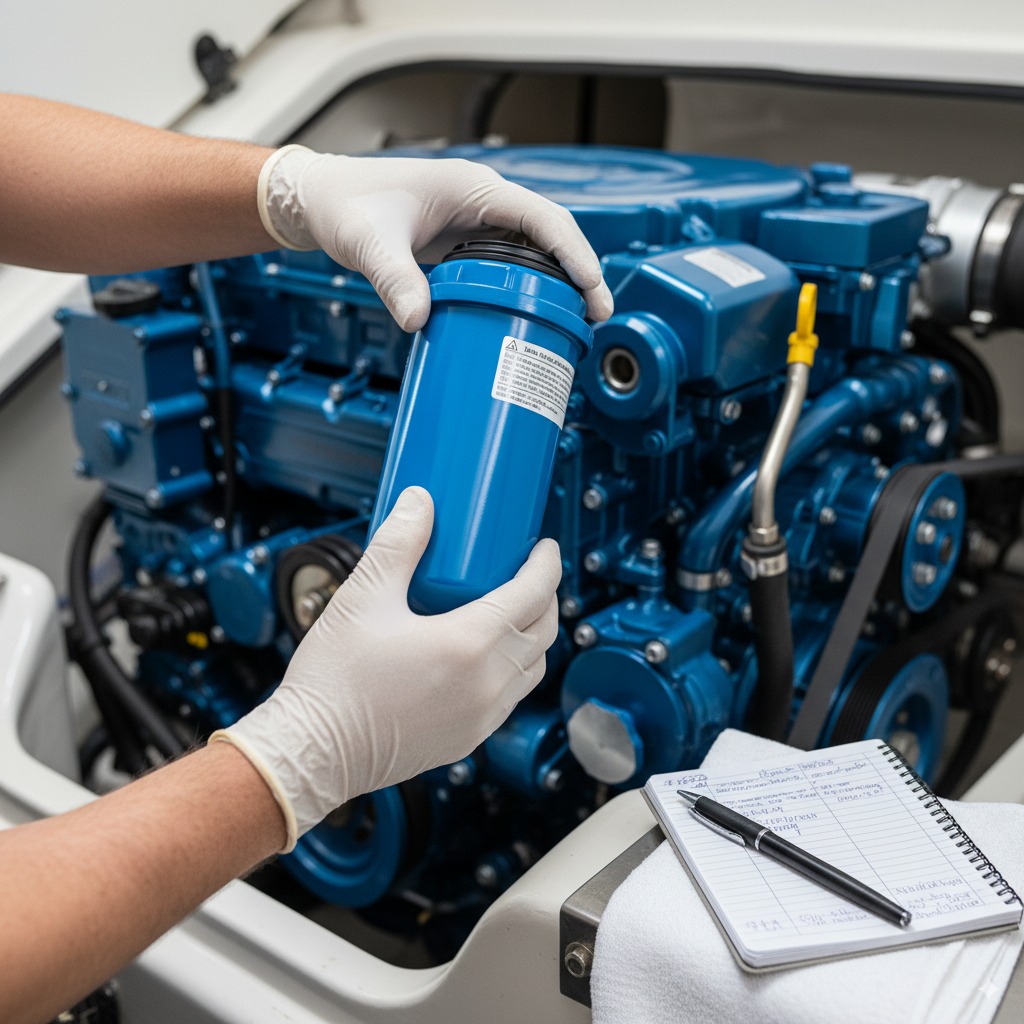I’ll never forget the call I got a few years ago. A family was stranded 10 miles offshore from Miami, their weekend ruined. Their engine, a beautiful, powerful diesel, had just… stopped. When I finally got to them, the problem was painfully obvious: a shredded impeller had caused the engine to overheat and seize. A five-dollar rubber part, neglected for too long, had destroyed a $20,000 engine.
That’s the brutal reality of boating. The marine environment is relentless. Saltwater, vibration, and long periods of sitting idle are a death sentence for an engine that isn’t looked after. This is why I tell every single one of my clients that a solid plan for preventive maintenance for marine engines isn’t just a good idea—it’s the most important part of owning a boat.
Forget the stress of wondering if you’ll make it back to the dock. Forget the nightmare repair bills. This guide is my 15 years of experience boiled down into a straightforward approach. It’s about turning worry into confidence and keeping your engine ready for anything. Let’s dive into the real secrets of proper preventive maintenance for marine engines.
Table of Contents
The Power of Looking Ahead
Why am I so obsessed with proactive care? Because I’ve seen what happens when it’s ignored. The benefits of a good maintenance routine are huge:
- Reliability and Safety: This is number one. A well-maintained engine is a predictable engine. You can trust it to get you home safely. True preventive maintenance for marine engines is about peace of mind.
- Longer Engine Life: You want to delay that massive bill for a rebuild or a new motor as long as possible, right? Regular upkeep is how you do it.
- Better Fuel Efficiency: A smooth-running engine burns less fuel. It’s that simple.
- Higher Resale Value: When you go to sell your boat, a thick binder full of maintenance records is like gold. It shows you cared, and buyers will pay a premium for that.
The Big Three: An Engine’s Life Support Systems
Every marine engine, whether it’s a small outboard or a giant diesel, relies on a few core systems to stay alive. Mastering the basics of preventive maintenance for marine engines means focusing on these vital areas.
- The Lubrication System: Engine oil is its lifeblood. It cools, cleans, and lubricates. Check your oil level before every single trip. Look at the color. Is it milky? That means water is getting in—a major red flag. Change the oil and filter religiously according to your manual, usually every 100 hours or at least once a year.
- The Fuel System: Bad fuel is the number one cause of engine problems I see. Number one. Use a fuel stabilizer, especially if the boat sits for a while. Change your fuel filters on a strict schedule. I’ve seen engines starved for fuel all because of a $10 filter that was clogged solid. A key part of preventive maintenance for marine engines is keeping the fuel clean.
- The Cooling System: Overheating is the fastest way to kill an engine. Your engine’s cooling system has two parts: a raw water side and a closed coolant side (on most inboards). Keep the raw water strainer clean. And that little rubber impeller? It’s the heart of the system. I tell people to change it every year or two, no excuses. It’s the cheapest insurance you can buy.
Your Game Plan: A Simple Maintenance Schedule
It’s easy to get overwhelmed. To make it simple, I give my customers a basic schedule. A structured approach to preventive maintenance for marine engines makes it manageable.
| When | What to Check | My Two Cents |
|---|---|---|
| Before Every Trip | Oil & coolant levels, look for leaks, check belts | A 5-minute walk-around can save your whole day. |
| Monthly (25-50 hrs) | Clean sea strainer, check battery terminals, inspect propeller | This is your early warning system. Catches problems while they’re small. |
| Mid-Season (100-200 hrs) | Change oil & filter, change fuel filters, inspect anodes | This is the core of your annual maintenance. |
| Annually/End of Season | Change impeller, gear lube (outboards), winterize | Proper storage prep is crucial. Don’t skip winterization. |
And please, write it down! Keep a logbook. Note the date, the engine hours, and what you did. That little book will be your best friend when you’re trying to troubleshoot a problem or sell the boat. This documentation is a cornerstone of effective preventive maintenance for marine engines.
Different Strokes for Different Folks: Engine-Specific Tips
Not all engines are the same. A good plan for preventive maintenance for marine engines has to be tailored to what you own.
- Outboards: Pay special attention to the lower unit. Change that gear lube annually. And always, always flush the engine with fresh water after running in salt.
- Diesel Inboards: These are workhorses, but they hate dirty fuel. Water separators are your best friend. Bleeding the fuel system is a skill you should learn.
- Brand Specifics: A Volvo Penta with all its fancy electronics needs a different touch than a simple, old Johnson outboard. Your owner’s manual is your ultimate guide here. Follow it.

The Toolkit: What You Actually Need
You don’t need a professional-grade workshop, but a few key tools and spares will make your life a lot easier.
- The Basics: A good set of wrenches and sockets, screwdrivers, and pliers.
- Specialty Tools: An oil filter wrench, a spark plug socket, and an impeller puller will pay for themselves many times over.
- The Spares: Keep a spare set of fuel and oil filters, a spare impeller, and spare spark plugs on the boat. These are the small things that can leave you stranded. Being prepared is a vital part of preventive maintenance for marine engines.
FAQ: Questions I Get Asked at the Marina
How often should I really have a pro look at my engine?
Even if you do all the routine stuff yourself, I recommend a professional diagnostic check-up every 3-5 years. A certified mechanic can spot things you might miss. This is a smart part of any long-term plan for preventive maintenance for marine engines.
Is it worth using more expensive OEM parts?
For critical components like sensors or internal engine parts, yes. For simple things like filters, high-quality aftermarket brands are often just as good and can save you money.
What’s the single biggest mistake boat owners make?
Ignoring the small things. They see a little rust on a hose clamp or a small drip and think, “I’ll get to it later.” Later often turns into a call to me on a Saturday afternoon.
Can I do this myself if I’m not a mechanic?
Absolutely. Start small. Learn to change your oil and filters. Buy a manual and read it. Every task you complete will build your confidence. The journey of preventive maintenance for marine engines starts with a single step.
How do I know if my mechanic is any good?
Ask for certifications. Ask for references. A good mechanic will be happy to show you the old parts and explain exactly what they did and why.
Conclusion: Your Ticket to Worry-Free Boating
At the end of the day, preventive maintenance for marine engines is not about spending money; it’s about saving it. It’s an investment in safety, reliability, and your own peace of mind. It’s what turns a boat from a source of stress into a source of joy.
So, get to know your engine. Create a schedule. Keep good records. And don’t be afraid to get your hands a little dirty. The confidence you’ll gain is priceless. That feeling of turning the key and hearing your engine fire up instantly, every single time—that’s what it’s all about.
Author Bio
I’m Alex, a 15-year marine technician in South Florida, ABYC-certified. My career is built on the principles of preventive maintenance for marine engines. From outboards to inboard diesels, I’ve helped hundreds of boaters at marinas like Dinner Key and Bahia Mar keep their engines running reliably, season after season.


Leave a Reply